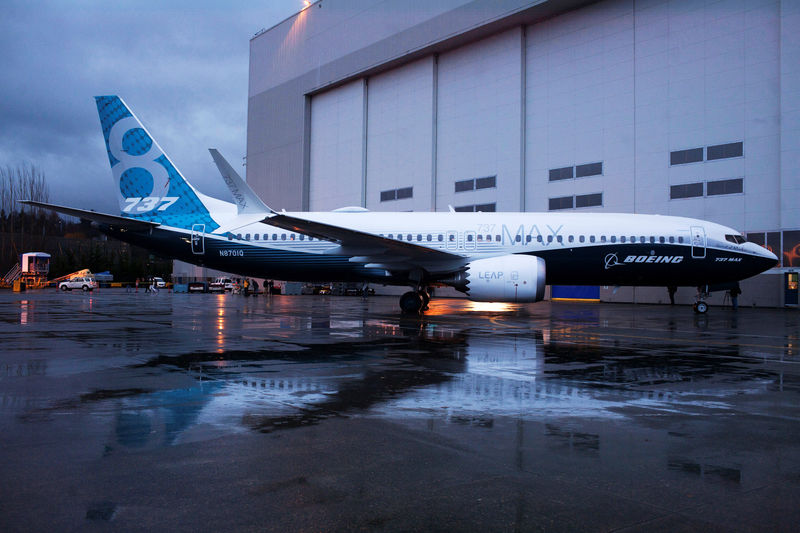By Eric M. Johnson and Tim Hepher
SEATTLE/PARIS (Reuters) - Boeing Co (N:BA) is weighing plans to launch a software upgrade for its 737 MAX in six to eight weeks that would help address a scenario faced by the Lion Air crew during last month's deadly crash in Indonesia, two people briefed on the matter said on Thursday.
Crash investigators are focusing on the possibility that a new anti-stall system that repeatedly pushed the Lion Air jetliner's nose down was being fed by erroneous data from a faulty sensor left in place after a previous hazardous flight.
Boeing has said cockpit procedures that were applied on the previous flight are already in place to tackle such a problem, and that its 737 series remains safe to fly.
But U.S. regulators have said Boeing is also examining a possible software fix, after coming under fire for not outlining recent changes to the automated system in the manual for the 737 MAX, the latest version of its best-selling passenger jet.
While plans for the possible fix are not final, Boeing's software upgrade could block the recently modified anti-stall system, known as MCAS, from continuously running until the plane hits its nose-down limit, the sources said.
The MCAS function would be disabled if the crew counteracted it by trimming or adjusting settings in the opposite direction, according to two people briefed on Boeing's proposals.
"When the crew makes the adjustment, that would essentially disengage MCAS unless it got new data," one of the people said.
Data from the Lion Air flight recorder suggests the pilots sought to correct the system more than two dozen times before the jetliner plunged into the Java Sea on Oct. 29, killing all 189 people onboard.
Attention has focused on the role of a suspect "angle of attack" sensor used to drive alerts on stall or loss of lift.
While each 737 has two of these blade-shaped vanes, the plane's anti-stall system relies on data pulled from just a single vane during each flight, compared with a three-sensor "voting" system on rival Airbus (PA:AIR) jetliners.
Boeing's software update would come as an emergency measure from Boeing and Federal Aviation Administration, the sources said.
SECOND PROBE
The specific system for preventing stalls was not originally designed to monitor both probes because regulators assumed risks of a mishap were small and would be further reduced by the presence of a trained crew and power switches on errant systems.
Now, however, Boeing is examining whether the anti-stall system should also check data from the second probe before engaging, according to a person briefed on the matter.
Boeing declined comment on the proposed changes.
"As part of our standard practice following any accident or incident, we examine our aircraft design and operation, and when appropriate, issue bulletins and make recommendations to operators to further enhance safety," a Boeing spokeswoman said.
"Boeing continues to evaluate the need for software or other changes as we learn more from the ongoing investigation."
The FAA has repeatedly said it will "take further action if findings from the accident investigation warrant."
A decision to update the software has not been finalised and Boeing could choose a different strategy, the people said.
The world's largest planemaker has 4,542 of the upgraded 737 MAX on order from airlines, worth over half a trillion dollars at list prices, or about half that after typical discounts.

Boeing has delivered 241 of the jets to customers since it entered service last year, according to its website.